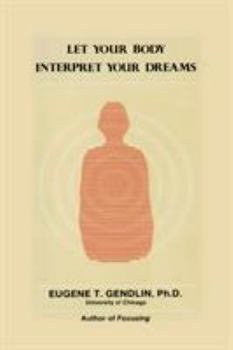Let Your Body Interpret Your Dreams (P)
Select Format
Select Condition 
Book Overview
In research at the University of Chicago, Dr. Gendlin found that certain specific bodily responses can open up and lead to small steps of new experience. These bodily responses can indicate the steps for interpreting a dream. Theories about dreams differ and give contradictory interpretations. Dr. Gendlin derived 16 questions from the many existing theories to aid you, the dreamer, in the process of interpretation. In this book, Dr. Gendlin...
Format:Paperback
Language:English
ISBN:0933029012
ISBN13:9780933029019
Release Date:April 2004
Publisher:Chiron Publications
Length:200 Pages
Weight:0.77 lbs.
Dimensions:0.5" x 6.0" x 9.0"
Customer Reviews
2 ratings
Become Your Own Dream Expert!
Published by Thriftbooks.com User , 15 years ago
Eugene Gendlin is best-known for Focusing. (See Focusing, and my review.) Here, he applies Focusing to interpreting dreams. And not only Focusing, but using Focusing, Gene teaches how to better apply many different schools of dream interpretation. Focusing was "discovered" in the 1950's, studying clients who did & didn't succeed at psychotherapy. Clients who succeeded "Focused", or said another way, they attended to their body-based felt-sense as a guide. This same guide -your felt sense of the dream - can help you interpret your dreams. As Gene says, "The interpretation comes inside the dreamer or not at all... Only the dreamer's body can interpret the dream." Disclosure: While Gene developed this method in the 1980's, I was a trainer in his Focusing workshops. As a psychotherapist, I've used his system of dream interpretation with my clients for over 20 years. What's a felt sense, and how is it a guide? Gene writes, "The felt sense isn't a usual feeling, like angry, scared, or sad. In addition to such recognizable feelings, a dream also leaves you with a unique felt quality that fits no category. You cannot think it. It is an indefinable, global, puzzling, odd, uneasy, fuzzy sense in your body. With our method, you direct the questions there - to [your] felt sense. Then you wait to see if something new comes in you." With your own inner guide and his system of questions, you're not stuck in one style of dream interpretation - say Freud's or Jung's. Gene writes, "[You're] not limited to any one theory or belief system... Here is a way to use all their approaches without being committed to one..." A big claim, but I've found Gene's system of questions plus Focusing powerful. You can see Gene's dream questions - his Stage I of dream interpretation - on-line at www.focusing.org in the Gendlin On-Line Library. The book has chapters that help you apply these questions to dreams, giving examples with many "how-to" pointers. And there's more: Gene writes, "Dreams are mysterious, nothing about them is sure... An interpretation from one theory makes a lot of sense, but when you hear the interpretation from another theory it makes sense, too. ...stay open to all ways of interpreting." This leads to Gene's Stage II of dream work, "bias control", which, he says is usually needed with dreams of depth or complexity. Again, Gene: "A breakthrough may let you know what the dream is about, but you may find that it teaches you nothing you didn't know before. You can go on to a second stage... We tend to put on the dream the same... view we put on anything in life. Then the dream seems to say the sort of thing we always say to ourselves." "...[a dream] is more than what I know. But when I interpret my own dream, I use the meanings I know. Therefore I must exactly miss more than I already know. How can I get beyond that? ...BIAS CONTROL enables my body to do it, not every time, but often." Stage II goes beyond interpretat
Intuitive Dream Work
Published by Thriftbooks.com User , 15 years ago
I am a huge admirer of Dr. Gendlin's work in philosophy and psychology. This book, dealing with how to appreciate and interpret dreams, and how to find further steps of growth from your dreams, is very helpful. I've had an interest in dreams for a while, and much of Gendlin's approach resonates with what I learned from my own experience. In crucial respects, his approach has also extended my work with dreams in beneficial ways, for which I am grateful. This book is basically 'focusing' applied to dreams. If you don't know what focusing is, search it on google or poke around www.focusing.org. But it also contains a good deal of Gene Gendlin's wisdom beyond the focusing procedure, per se. You get the sense of a very wise and warm person coming across in these pages. Gendlin's expository style is unique, and can take a little getting used to. But it's well worth doing in this case. My only complaint is that I don't think he adequately cites where certain ideas are coming from-- whilst his reasoning is usually quite lucid, he can be a bit vague about the context and direction from which ideas/methods/practices come. Overall, I highly recommend this book to anyone interested in working with their own dreams, especially if 'focusing' is part of your life.






